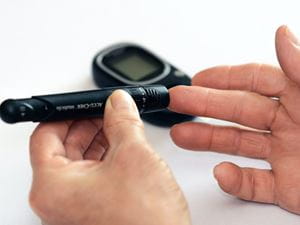
Both physical and emotional stress harms the body in many ways. One of the potential effects on health is a spike in blood sugar levels. When the body experiences high levels of constant stress, it releases extra cortisol, the prime stress hormone. A more elevated serum cortisol level causes the body to decrease insulin secretion. Without the proper insulin release, more sugar stays in the bloodstream, causing the blood sugar levels to become imbalanced.
Stress can affect blood sugar both indirectly and directly. The effects can also vary depending on a person’s diabetes type. Chronic stress can lead to prolonged high cortisol levels and lowered insulin secretion down the road. This makes stress dangerous for people with diabetes and a possible risk factor for development.
How stress affects the body.
When the body undergoes stress, it releases cortisol. Cortisol is created from cholesterol and then released in the adrenal glands. The hypothalamus-pituitary-adrenal axis, a unit in the braid made up of the pituitary gland, the hypothalamus, and the adrenal glands, regulates cortisol production and how much of it is released during emotional and physical stress periods.
When the body sends physical and emotional stress signals, it releases cortisol to help the body control blood pressure, respond to a perceived threat, and reduce inflammation. It’s the hormone used for the fight or flight response, so the body will be ready to run from it or face it if there’s an impending danger. Cortisol also encourages the liver to release fatty acids and glucose to help give the body the necessary energy to deal with stress.
From an evolutionary perspective, releasing cortisol to handle stress was essential for survival. However, times have changed, and those threats to life are nonexistent, meaning that cortisol is released but not used by the body in ways intended to be used in some situations. Stress can be broken down into two types: mental or emotional stress or physical stress. Psychological or emotional stress originates internally and can happen for numerous reasons. Some reasons, like becoming angry in traffic or nervousness for a job interview, can lead to an emotional stress response, as can going through a traumatic event or losing a loved one.
On the other hand, physical stress comes from external sources like prolonged physical activity, strenuous exercise, or physical injuries and traumas. When experienced long-term, both types of stress can lead to various adverse diseases and health effects, like cancer, cardiovascular disease, diabetes, and immune system suppression.
Stress in those with type 1 diabetes.
Stress can affect people with type 1 diabetes by decreasing and increasing blood sugar. When it lowers blood sugar levels, constant stress can lead to adrenal fatigue, a syndrome where prolonged stress drains the adrenal glands, leading to low cortisol levels. In people with type 1 diabetes, underproducing hormones like cortisol can cause hormonal imbalances meant to regulate blood sugar levels. Research has observed whether stress can cause diabetes, and many studies have determined that chronic stress can contribute to the beginning of type 1 diabetes in people already susceptible to developing it.
Stress in those with type 2 diabetes.
For those with type 2 diabetes, high-stress levels can lead to increased blood sugar levels. A high cortisol level in the body causes body tissues to be less sensitive to insulin, so more blood sugar is available in the bloodstream. When this occurs, blood sugar levels become unbalanced, reaching dangerously high levels, especially when left untreated.
Other ways stress can increase blood sugar levels.
Stress can lead to blood sugar spikes in other ways. During stressful times, people may partake in behaviors that could lead to high blood sugar, like emotional eating. People may choose not to exercise or take their medications when they should. Since stress can change healthy habits, these factors can lead to increased blood sugar levels.
Stress can also affect your sleep because the hypothalamus-pituitary-adrenal axis controls sleep and stress. When someone is under high stress and the axis encourages extra cortisol production, changes in the axis can happen. These changes can lead to issues getting quality sleep and changes in sleeping patterns. When someone isn’t getting enough sleep, it causes glucose intolerance or metabolic conditions that cause high blood sugar.
For people with diabetes, having blood sugar spikes can be harmful because too much sugar in the blood passes into your urine, triggering the body to filter out the fluid, leading to a diabetic coma or dehydration. If blood sugar levels spike due to stressors that can’t be managed, it’s essential to prioritize containing your blood glucose. You can do so by focusing on things you can control, like exercise and diet, regularly checking your blood sugar, and taking your medication.
Managing your stress levels.
Some stressors can’t be managed, especially if they’re not frequent, like an accidental injury or a one-time traumatic event. Other types of stress, like work stress, taking care of family, or any day-to-day stressful situations, will be there semi-permanently or permanently. These stressful events are the ones that should be managed as best you can.
To do so, you can proactively plan, meaning being prepared for the regular stressors of life and reading self-help books, managing your time, or minimizing the source of stress as much as you can. Calming exercises like meditation or yoga have also been proven to reduce stress. You’ll also want to avoid participating in unhealthy behaviors like overeating. It may seem comforting, but it won’t help relieve your stress. Setting manageable and realistic goals is also a significant stress reducer for people with diabetes.
Instead of focusing on vague and significant goals like losing weight, setting a goal of walking for 30 minutes every day on certain weekdays will be more achievable. Stress is a normal part of life, and no one can avoid it, so it’s essential to protect yourself from stress by having a plan to help manage stressful situations and drops or spikes in blood sugar levels.

